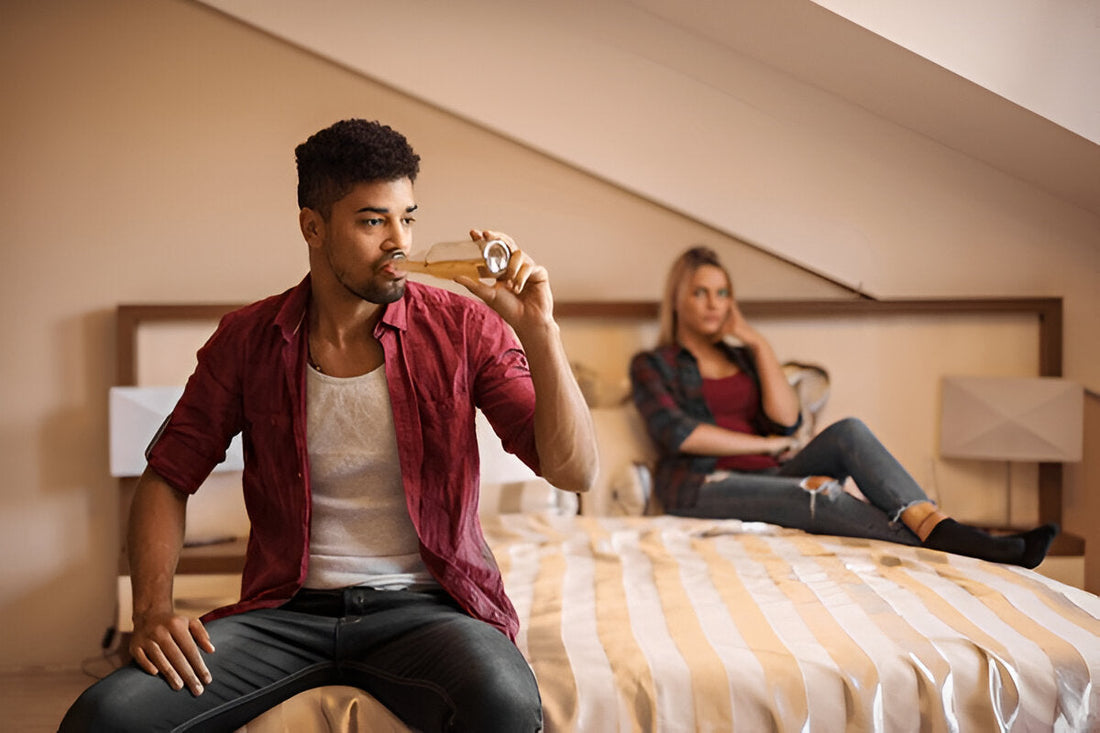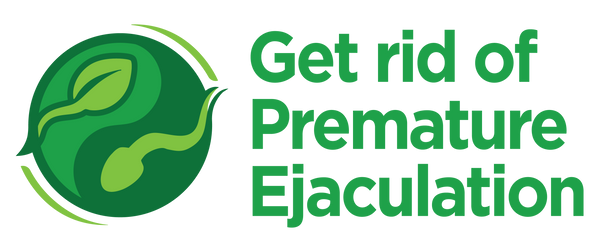
Alcohol and Premature Ejaculation: Understanding Effects
Table of Contents
[hide]
Alcohol and Sexual Performance: Separating Fact from Fiction
Many men reach for a drink before sexual activity believing alcohol will enhance their performance and staying power. This association between alcohol consumption and sexual performance is deeply ingrained in popular culture and personal beliefs. Particularly for those experiencing premature ejaculation (PE) or early climax, alcohol is often viewed as a readily available solution that might help delay orgasm and make you last longer in bed.
Common beliefs suggest that alcohol's relaxing properties and potential numbing effects could benefit men who finish too soon. But does science support these assumptions? The relationship between alcohol and sex drive in men is considerably more complex, with alcohol potentially both helping and hindering sexual performance depending on numerous factors.
Does Alcohol Affect Ejaculation Control?
Contrary to the belief that alcohol primarily causes delayed ejaculation, research suggests a more nuanced relationship between alcohol consumption and ejaculatory control. The physiological effects of alcohol on sexual response depend significantly on the amount consumed and frequency of use.
Alcohol affects the central nervous system as a depressant, slowing signal transmission between the brain and body. This impacts several aspects of sexual function:
- Nerve sensitivity: Alcohol can temporarily reduce penile sensitivity by dampening nerve responses
- Neurotransmitter balance: Alcohol disrupts the balance of neurotransmitters that regulate sexual arousal and ejaculation
- Blood flow: While initial consumption may increase blood flow, higher amounts can impair circulation necessary for erection
❌ Research indicates that chronic alcohol use is actually associated with increased rates of sexual dysfunction, including rapid ejaculation in some men. This seemingly contradictory effect occurs because long-term alcohol consumption can damage the nervous system pathways involved in ejaculatory control, potentially worsening ejaculatory dysfunction over time rather than improving it.
The Biphasic Effect of Alcohol on Sexual Performance
One of the most important aspects of alcohol's relationship with sexual function is its biphasic effect—meaning it produces different effects depending on blood alcohol concentration. Many wonder "why do I last longer when drunk?" - the answer lies in understanding these dual effects.
At low doses (typically 1-2 standard drinks):
- The "disinhibition effect" can reduce anxiety about sexual performance
- Relaxation may temporarily reduce performance anxiety that contributes to coming too quickly
- Some men report slight delays in ejaculation due to mild numbing effects
At higher doses (typically 3+ standard drinks):
- Central nervous system depression significantly impairs sexual function
- Coordination and sensation become compromised
- Erectile difficulties become more common
- Ejaculatory control mechanisms can become unpredictable
✅ Understanding alcohol's biphasic effect helps explain why many men report contradictory experiences with alcohol and sexual performance—what works on one occasion may have the opposite effect on another.

Does Alcohol Make You Last Longer in Bed?
The question of whether alcohol helps with early ejaculation requires examining both short-term effects and long-term consequences. While some men report temporary benefits, the evidence suggests alcohol is not a reliable or healthy solution for managing rapid ejaculation.
The perception that alcohol makes you last longer in bed stems primarily from:
- Temporary numbing of penile sensitivity that may delay orgasm
- Reduction in performance anxiety that can contribute to climaxing early
- Subjective perception of longer performance (which may not match reality)
However, research studies examining alcohol's effects on ejaculatory control show inconsistent results at best. Many men who believe alcohol delays their ejaculation are experiencing an altered perception of time rather than actual improved performance. The question "does alcohol make sex better?" is complex - while it might initially reduce inhibitions, it often compromises physical function.
Perhaps most concerning is the risk of developing psychological dependency on alcohol for sexual performance. Men who regularly use alcohol to manage early orgasm may find themselves unable to perform confidently without drinking, creating a cycle of dependency that can lead to other sexual dysfunctions and health problems.
Is There a "Best" Alcoholic Drink for Sexual Performance?
The idea that certain alcoholic beverages might be superior for improving sexual stamina is common in casual advice and internet forums. Some suggest red wine might offer special benefits, or that whiskey makes you last longer in bed. But does liquor truly affect sexual performance differently than other forms of alcohol?
From a scientific perspective, the primary active ingredient affecting sexual function in all alcoholic beverages is ethanol (ethyl alcohol). While different drinks contain varying additional compounds:
- The quantity of alcohol consumed has a far greater impact than the type of beverage
- Any minor differences between beverages are overwhelmed by ethanol's dominant effects
- Individual responses are more likely due to psychological expectations than physiological differences
❌ The concept of an alcoholic beverage that specifically helps with finishing too soon lacks scientific support. No wine, beer, or spirit has been shown in clinical studies to reliably improve ejaculatory control better than others.
Alcohol Sexual Side Effects and Long-Term Impacts
Using alcohol as a regular strategy for managing ejaculatory dysfunction can lead to significant negative consequences over time, affecting both sexual health and overall wellbeing. Understanding alcohol's effect on male libido and sexual function is crucial.
Physical dependence risks include:
- Developing tolerance, requiring more alcohol to achieve the same perceived benefits
- Potential liver damage and other alcohol-related health conditions
- Worsening of sexual function, including erectile dysfunction and decreased libido in men
- Deterioration of the neural pathways involved in ejaculatory control
Psychological consequences can be equally problematic:
- Developing belief that satisfactory sexual performance is impossible without alcohol
- Increased anxiety about sexual performance when sober
- Potential relationship strain as partners may object to regular pre-sex drinking
Research indicates that while alcohol might seem helpful in the short term, continued use as a management strategy for premature climax typically leads to declining sex drive and sexual function rather than improvement.

Alcohol and Sex Drive: Interactions with PE Treatments
For men receiving treatment for ejaculating too fast, it's essential to understand how alcohol might interact with these therapies, potentially reducing their effectiveness or causing adverse effects. Many don't realize how alcohol affects sexuality and treatment outcomes.
Medication interactions:
- SSRIs used for PE (such as dapoxetine) can interact negatively with alcohol, increasing side effects like dizziness and drowsiness
- Topical desensitizing products may become less effective when combined with alcohol's own numbing effects
- PDE5 inhibitors (like sildenafil) used for early climax in combination with erectile dysfunction can have enhanced hypotensive effects with alcohol
Behavioral technique interactions:
- The "stop-start" and "squeeze" techniques require precise awareness of arousal levels, which alcohol can significantly impair
- Mindfulness-based approaches become less effective under the influence of alcohol
✅ Healthcare providers typically recommend limiting or avoiding alcohol when undergoing treatment for rapid ejaculation to maximize treatment effectiveness.
Healthier Approaches to Managing Premature Ejaculation
Rather than relying on alcohol's unpredictable effects on sexual performance, men dealing with early orgasm have access to numerous evidence-based solutions with proven effectiveness and safety. For those who want to know how to last longer in bed without alcohol, consider these options:
Effective physical treatments include:
- Topical desensitizers: Products containing lidocaine or benzocaine can temporarily reduce penile sensitivity without the systemic effects of alcohol
- Prescription medications: SSRIs like dapoxetine specifically developed for ejaculatory dysfunction provide consistent results for many men
- Natural supplements: Formulations containing ingredients like Ashwagandha, folic acid, and zinc have shown promising results without the sexual side effects of alcohol
Behavioral approaches offer long-term benefits:
- The "stop-start" technique and "squeeze" method develop greater awareness of arousal levels
- Pelvic floor exercises strengthen muscles involved in ejaculatory control
- Mindfulness practices help reduce performance anxiety that can trigger finishing too soon
Unlike alcohol, these approaches target the actual mechanisms involved in premature sexual climax rather than temporarily masking symptoms or simply altering perception.
Conclusion: Alcohol and Premature Ejaculation
The relationship between alcohol and rapid ejaculation is more complex than commonly believed. While low doses may temporarily help some men through reduced anxiety or slight desensitization, alcohol is ultimately an unreliable and potentially counterproductive approach to managing early climax. The question "does alcohol make you last longer in bed?" has a complicated answer - potentially yes in the short term, definitely no in the long term.
Key takeaways about alcohol and ejaculatory dysfunction include:
- Short-term effects vary widely between individuals and drinking occasions
- Long-term use can worsen ejaculatory control and overall male libido rather than improve it
- No specific alcoholic beverage (including whiskey or other liquors) offers special benefits for sexual performance
- The risks of developing dependency and other sexual side effects are significant
Men seeking effective management of finishing too soon are encouraged to explore proven treatments like topical products, behavioral techniques, or natural supplements specifically formulated for ejaculatory control. These approaches address the actual physiological and psychological factors behind coming too quickly rather than temporarily altering perception.

